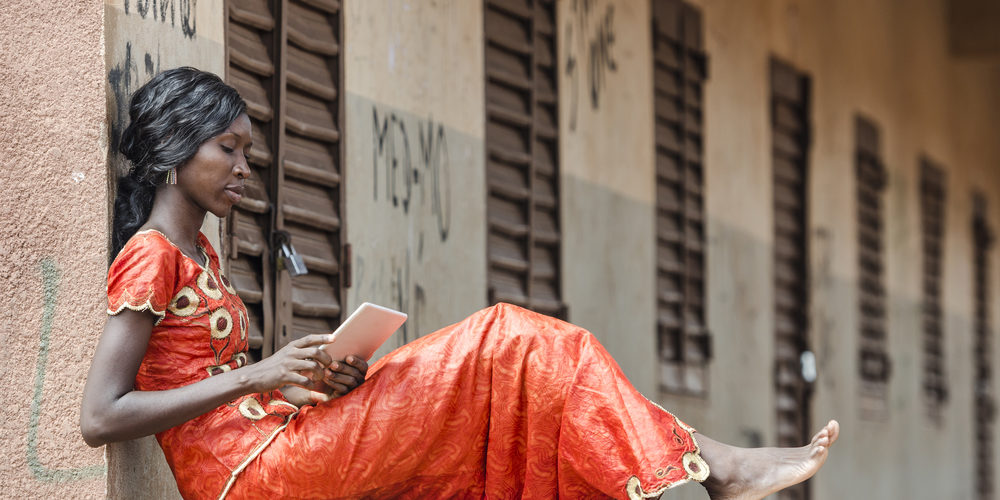So digital, so analogue

You approach a junction, and see some swish-looking traffic lights, complete with digital countdown timers. Nice, you think. Except no one is looking at the lights. There is a traffic policeman on duty guiding the vehicles, badly, even as the lights do their thing above his head. No matter how much was paid for those lights, the old-fashioned cop is in charge.
Africa is going digital rapidly, while remaining intensely analogue.
A little further along, you notice a busy looking young executive, seated back-left in an Uber, tapping away on a smartphone. Possibly making some quick digital-money transactions. Meanwhile ahead of the executive’s taxi is a mkokoteni handcart. The puller is heaving away with a back-breaking load, slowing everyone down.
Now you too are stuck in the traffic caused by the slow-moving handcart. You decide to catch up with the latest stockmarket prices on your own device. There is a knock at your car window. It is a blind beggar and his handler, waving a tin cup at you. You cannot tell if the beggar is actually blind, or faking it.
You look away, and switch to your Twitter feed. So much wonderful information and rich insights there for you every day, in a tailored format. But as you scroll down you see another nasty Twitter fight has erupted today, with accusations, bile and bigotry flying in all directions, fuelled by paid influencers and bot factories. Real is fake, and fake is real, and it’s hard to tell the difference anymore.
You put the ugliness away by switching off your device. You see some young adults queuing up at an ATM, and wonder why they still draw cash when their world is supposed to be all about M-Pesa and mobile apps. If you asked them they would tell you: physical cash never went anywhere – yet. Fees and charges keep them handling soiled notes, even as they click and pay with ones and zeros.
You eventually arrive home and remember you need to complete a registration process. Your government has a new citizens’ website, so that you can do this in the comfort of your own home instead of lining up in interminable queues. You manage to complete your registration quite easily. It works! Except, it really doesn’t. You discover at the end that you have to print everything out and take it to the government office for final approval. The new digital part is just a layer on the old analogue process.
When I talk to folks in Kenya and similar neighbouring economies, it is easy to distinguish two distinct types of voices. First, there are the digital enthusiasts. These folks stay in a perpetual state of over-excitement about a tech leapfrog for Africa – the idea that we will go from zero to hundred powered by our new enthusiasm for all things digital. On the other side there are the analogue naysayers, who dismiss every innovation with the damning words, ‘This is Africa, my friend. The problems are too great. The new-fangled stuff won’t work here.’
I would ask you to take both those points of view with very large doses of salt. Both have their agendas. One side is busy trying to make quick new money via digital initiatives and hyping up the potential of new technologies so as to source funding; the other is trying to protect old money by blocking any change and progress. One set of voices is a little hysterical; the other is more than a little cynical.
Could we get real and see the actual world around us? Yes, huge progress has been made with mobile money and digital apps. Yes, artificial intelligence and blockchains and big data could yet power some dramatic changes in healthcare, education and service delivery. But the analogue world has not gone anywhere. It must be tackled, accommodated and addressed first.
Anyone looking at a digital answer to old problems must understand the old problems first. As Nanjala Nyabola points out in her new book, Digital Democracy, Analogue Politics, you can’t just foist digital devices onto a flawed electoral process that suits entrenched political interests. And you certainly can’t do it without fully empowered and independent regulatory institutions to guide the way.
At the moment, digital is colliding with analogue – sometimes explosively. The two will have to play hand in hand, not side by side. That will take some doing. Where to begin? First, realise that our task is to understand both sides deeply, and diagnose the challenge correctly before looking at the opportunity.
(Sunday Nation, 14 April 2019)
Sunny Bindra’s new book, The Bigger Deal, is now on sale.

Buy Sunny Bindra's new book
The X in CX
here »
Popular Posts
- Where are you rushing to—your funeral?June 29, 2025
- The map will appear—once you start walking.July 6, 2025
- Built the app, forgot the flowJune 22, 2025
- How to spot a real thinkerJune 15, 2025











